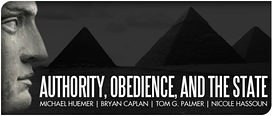Thanks to Nicole Hassoun for her reply to my post on global poverty. Two reactions:
I. My original claim was not that Hassoun explicitly said that “we currently respect everyone’s negative rights.” My precise statement, rather, was that she “seems to be saying” this. By emphasizing the positive rights of the global poor, Hassoun creates a strong impression that violations of the global poor’s negative rights by First World governments are, empirically, not worth talking about.
Notice that Hassoun’s entire post on global poverty never even uses the words “immigration,” “immigrant,” or “immigrate.” Given the magnitude of the wage gap between unskilled workers in the Third World and the First, this is a huge omission.
I am delighted to learn that Hassoun agrees that we should “significantly liberalize movement in labor.” At the same time, though, I’m puzzled why she says “significantly liberalize” rather than “fully liberalize.” Don’t both the positive and negative rights that she endorses require full liberalization?
II. Hassoun states:
I do not believe the best way of addressing the problem is through individual action. Again, my claim that “I do not have property rights that extend so far that they allow me to withhold essential goods that I do not need from those who will suffer and die without them” does not “imply a political obligation to … unilaterally give away most of [my] wealth to the Third World.” I believe states and international organizations can play important roles in redefining legal property rights to better protect, promote, and fulfill individuals’ moral rights.
Hassoun misquotes me. I said that her principle “implies a personal [not “political”] obligation to unilaterally give away most of [her] wealth to the Third World.” More importantly, given realistic empirical assumptions, Hassoun does indeed imply precisely the conclusion I name. Let’s flesh it out.
1. Hassoun does not have property rights that extend so far that they allow her to withhold essential goods that she does not need from those who will suffer and die without them. [Hassoun’s original premise, with “Hassoun” instead of “I.”]
2. People in the Third World are now suffering and dying due to lack of essential goods. [Certainly a true empirical claim.]
3. Third World suffering and dying will persist even if Hassoun takes all actions in her power other than massive personal financial donation, such as voting, political activism, blogging, and teaching. [An extremely probable empirical claim, given that Hassoun is only one person in a world of seven billion.]
4. Hassoun has essential goods (namely money) that she does not need. [An extremely probable empirical claim, given that she works as a professor in the First World, and First World professors earn far more than subsistence.]
5. People in the Third World will suffer and die if Hassoun withholds these essential goods. [An extremely probable empirical claim, given the existence of dire poverty and effective international charities.]
6. Therefore, Hassoun does not have property rights that allow her to withhold essential goods she does not need. In plain English, she has a moral obligation to donate all her surplus wealth to people in dire poverty. [From #1-#5.]
Of course, dire poverty will persist even if Hassoun does donate all the wealth she does not need. But her principle does not require her to end world poverty. It merely requires her to give away everything she does not need until dire poverty no longer exists.

